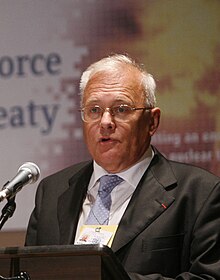Péter Balázs
Péter Balázs | |
|---|---|
 Balázs in 2009 | |
| Minister of Foreign Affairs | |
| In office 16 April 2009 – 29 May 2010 | |
| Prime Minister | Gordon Bajnai |
| Preceded by | Kinga Göncz |
| Succeeded by | János Martonyi |
| European Commissioner for Regional Policy | |
| In office 1 May 2004 – 21 November 2004 | |
| President | Romano Prodi |
| Preceded by | Monika Wulf-Mathies |
| Succeeded by | Danuta Hübner |
| Personal details | |
| Born | 5 December 1941 Kecskemét, Kingdom of Hungary |
| Political party | Independent |
| Children | 5 daughters 1 son |
| Profession | Diplomat, economist, politician |
Péter Balázs (Hungarian pronunciation: [ˈpeːtɛr ˈbɒlaːʒ], born 5 December 1941) is a Hungarian politician who served as Minister of Foreign Affairs from 2009 to 2010.
In addition to his native Hungarian, he speaks English, French, German and Russian.[1]
He graduated from Budapest School of Economics[2] in 1963 and worked in the Hungarian government until 1 May 2004, when his country joined the European Union and was appointed to the European Commission with Michel Barnier under Romano Prodi.[3]
He became the Hungarian European Commissioner holding the Regional Policy portfolio until the end of the Prodi Commission on 21 November 2004. He was succeeded by László Kovács as the Hungarian Commissioner[4] and Danuta Hübner as Commissioner for regional policy.[5]
Balázs became a professor at the International Relations and European Studies Department of the Central European University (CEU), Budapest. In 2005, he established a new research center for EU Enlargement Studies at the CEU.[6]
Balázs became the Hungarian Minister of Foreign Affairs in April 2009, serving until May 2010.[7] Balázs, when addressing the topic of Hungary-Slovakia relations compared the creation of the language law of Slovakia to the politics of the Ceauşescu regime on the use of language.[8][9][10] He was succeeded by János Martonyi.[11]
Balázs is a member of the advisory board of the Prague European Summit.[12]
External links
[edit]References
[edit]- ^ "Prof. Dr. Péter BALÁZS" (PDF). www.europarl.europa.eu. Retrieved 3 March 2023.
- ^ Maresceau, M.; Lannon, E. (1 March 2001). The EUs Enlargement and Mediterranean Strategies: A Comparative Analysis. Springer. ISBN 978-0-333-97781-1.
- ^ "Member of the Commission of the European Communities / the European Commission" (PDF). www.cvce.eu. Retrieved 3 March 2023.
- ^ Hargita, Ágnes (26 March 2018). Hungary's Way Back to Europe: On a Bumpy Road. Nomos Verlag. ISBN 978-3-8452-7812-4.
- ^ "Cabinet doors open for UK and Germany". POLITICO. 1 September 2004. Retrieved 3 March 2023.
- ^ "Enhancing European studies in Budapest". POLITICO. 13 October 2010. Retrieved 3 March 2023.
- ^ "[Interview] 'Hungary is test case for state capture'". EUobserver. 6 July 2018. Retrieved 3 March 2023.
- ^ "Index - Külföld - Kiakasztotta a szlovákokat Balázs Péter". 17 September 2009. Retrieved 3 March 2015.
- ^ Pozsony felháborodásának adott hangot Balázs Péter interjújával kapcsolatban[permanent dead link]
- ^ ORIGO. "Besokallt a szlovák külügy Balázs interjúja miatt". origo.hu/. Retrieved 3 March 2015.
- ^ "Hungary announces small government". POLITICO. 4 May 2010. Retrieved 3 March 2023.
- ^ "International Programme Board".
- 1941 births
- Living people
- People from Kecskemét
- Hungarian European commissioners
- Ministers of foreign affairs of Hungary
- Academic staff of Central European University
- Ambassadors of Hungary to Germany
- Corvinus University of Budapest alumni
- Members of the Bajnai Government
- Hungarian politician stubs
- European politician stubs
- European Union stubs
